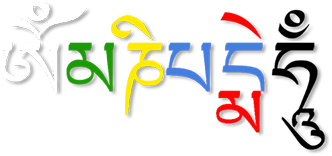I Am Awake l Buddha l Metta Sutra l We Are What We Think l Live In Joy l Discourse On Blessings l Healing Prayer l Buddha's Last Words l Tibetan Art l Books l Music l Movies l Links l Home l Support l Buddhist Sacred Texts
Om Mani Padme Hung
( Jewel of Enlightenment is in the Heart )Om Mani Padme Hung
Think:
May all beings have happiness and the cause
of happiness, which is virtueOm Mani Padme Hung
Pray:
May all beings remain free from suffering and the causes of suffering, which are non-virtue and delusionOm Mani Padme Hung
Wish:
May all beings remain unseparated from the sacred
joy and happiness, that is totally free from sorrowOm Mani Padme Hung
Pray:
May all beings come to rest in the boundless, all-inclusive equanimity beyond attachment and aversionOm Mani Padme Hung
Affirm:
May all beings be happy, content, and fulfilledOm Mani Padme Hung
May all be peaceful, in harmony, and at ease
Om Mani Padme Hung
May all be protected from harm, fear, and danger
Om Mani Padme Hung
May all have whatever they want, need, and aspire to
Om Mani Padme Hung
May all be healed and whole again
Om Mani Padme Hung
May this planet be healed and whole again
Om Mani Padme Hung
May all beings awaken from their sleep of illusion and be liberated, enlightened, and free
Om Mani Padme Hung
May all realize their true spiritual nature and awaken the Buddha within
Om Mani Padme Hung
May all equally enjoy, actualize, and embody the innate Great Perfection
Om Mani Padme Hung
Om Mani Padme Hung
Om Mani Padme Hung
Om Mani Padme Hung
Om Mani Padme Hung
Om Mani Padme Hung
ཨོཾ་མ་ཎི་པ་དྨེ་ཧཱུྃ
Tibetan: Om Mani Peme Hung or Om Mani Beh Meh Hung
Tibetan Buddhists believe that saying the mantra Om Mani Padme Hung, out loud or silently, focuses the mind, invokes the powerful benevolent attention and blessings, and accumulates merit.
The mantra was given by Padmasambhava ("Lotus Born", Guru Rinpoche, "Precious Guru") the legendary Indian Buddhist mystic who brought Tantra to Tibet. He urged to accept Chenrezig (Avalokiteshvara), the embodiment of compassion as the deity of Tibet.
The mantra originated in India. As it moved from India into Tibet, the pronunciation changed, modified and adapted to the local dialects, because some of the sounds in the Indian Sanskrit language were hard for Tibetans to pronounce.
About Mantra
Mantra is a sacred sound, or a short phrase, usually in Sanskrit, which is used in meditation to focus and train the mind, and in practice — to call and direct spiritual energies.
The Om Mani Padme Hung mantra is associated with Chenrezig (Bodhisattva Avalokiteshvara), and literally means "Om Jewel Is In The Lotus".
OM – an evocation of spiritual power, the absolute
Mani – means "jewel" or "bead"
Padme – is the lotus flower
Hung – represents the spirit of enlightenmentFor Tibetan Buddhists, "jewel in the lotus" represents Bodhicitta (mind of awakening, Tib: byang chub kyi sems), and the wish for enlightenment and liberation.
Each of the six syllables in the mantra is thought to be directed at liberation from a different samsaric realm of suffering. Reciting the mantra, reading the words, or writing them purifies karma.
The mantra Om Mani Padme Hung is very powerful because it contains the essence of the Buddha's entire teachings, both open and hidden meanings.
Om – perfection in the practice of generosity
Ma – perfection in the practice of pure ethics
Ni – perfection in the practice of tolerance and patience
Pa(d) – perfection of perseverance
Me – perfection in the practice of concentration
Hung – perfection of wisdomViewing the written form of the mantra has the same effect — it is often carved into stones and placed where people can see it.
Spinning the written form of the mantra around in a prayer wheel is also believed to give the same benefit as saying the mantra, and Mani wheels, small hand wheels, and large wheels with millions of copies of the mantra inside, are found everywhere in Tibet.
The mantra Om Mani Padme Hung is found written on flags (wind horse), prayer wheels, everyday objects, clothing, jewelry, etc. in Tibetan script.
The Prayer Wheel:
Spiritual Technology from Tibet
Sanskrit form Om Mani Padme Hum mantra of Avalokiteshvara.
Tibetan form Om Mani Padme Hung mantra of Chenrezig.
I Am Awake l Buddha l Metta Sutra l We Are What We Think l Live In Joy l Discourse On Blessings l Healing Prayer l Buddha's Last Words l Tibetan Art Gallery l Books l Music l Movies l Links l Home l Support l Buddhist Sacred Texts


